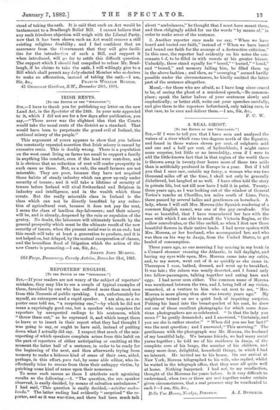REPORTERS' ENGLISH.
[To THE EDITOR OF THE "SPECTATOR."] SIR,—If your readers are not weary of the subject of reporters' mistakes, they may like to see a couple of typical examples of them, furnished by one who has suffered more than most men from this Nemesis of public speaking. I am, unfortunately for myself, an extempore and a rapid speaker. I am also, as a re- porter once told me, "a surprising one,"—by which he did not mean a suprisingly good one, but a speaker who surprises the reporters by unexpected endings to his sentences, which "throw them out," as he expressed it, and which tempt them to leave or to insert in their report what they had thought I was going to say, or ought to have said, instead of putting down what I actually did say. I suspect that much of the mis- reporting of which speakers complain arises from this habit on the part of reporters of either anticipating or omitting at the moment the latter half of a sentence, in order to be ready for the beginning of the next, and then afterwards trying from memory to make a hideous kind of sense of their own, aided, perhaps, in this effort, pace tied, by some able editor, who in- effectually tries to rescue from them their unhappy victim, by patching some kind of sense upon their nonsense.
• To some such causes as these I attribute such agonising results as the following :-1. "The question, the rev, speaker observed, is easily decided, by means of-salvation ambulances." I had said, 'This question is easily decided,—solvitur ambu- lando." The latter ending had evidently " surprised" the re- porter, and as it was war-time, and there had been much talk
about "ambulances," he thought that I must have meant them, and then obligingly added for me the words "by means of," in order to make sense of the sentence.
2. Another reporter once made me say, "When we have board and buried our faith," instead of "When we have bared and bound our faith for the scourge of a destructive criticism."
In this case, the reporter had evidently on his notes the con- sonants b d, to be filled in with vowels at his greater leisure.
Unluckily, these stand equally for "bored," "buried," "bond," and "bound," and memory failing him, ho filled them up in the above fashion ; and then, as " scourging " seemed hardly possible under the circumstances, he kindly omitted the latter part of the sentence altogether.
Moral,—for those who are afraid, as I have long since ceased to be, of seeing the ghost of a murdered speech,—Be common- place; speak the latter halves of your sentences slowly and emphatically; or better still, write out your speeches carefully, and give them to the reporters beforehand, only taking care, in that case, to be sure and deliver them.—I am, Sir, &c., P. C. W.














































 Previous page
Previous page